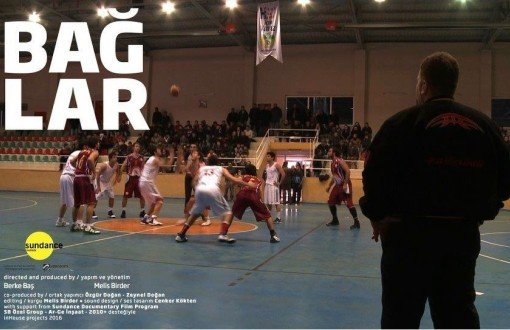Filmmaker team Berke Baş and Melis Birder have made one of the most important documentaries of the past five years in Turkey; “Bağlar” is just purely exceptional in its simplicity, honesty and meticulousness in laying out to the audience the Kurdish question by following Diyarbarkır’s “Bağlar” basketball team.
Though the title of the film “Bağlar” pertains to the name of the Bağlar district, the word’s layers are numerous. A verbatim translation to English could be “connections” or “attachments”, a word which astutely relays the notion of the connections between the Kurdish community with the rest the country’s communities, and the connections between years of state politics and the situation of South-East regions, most specifically through that of the manifestation of the daily urban life in Diyarbakır. But also, in a very personal way the title could signify the human deep connection between coach Gökhan Yıldırım and the young team players he has been mentoring and training, an emotional connection that is the most life-affirming constant strengthening the ties of solidarity and struggle in an uncertain political environment that directly affects not only daily practices, but also that of sports.
Shot over five years, starting from 2011, Baş and Birder take their main focus as the sympathetic coach Gökhan Yıldırım, a public school teacher by day and basketball coach by night. Yıldırım has emotionally and financially invested himself in the Bağlar District’s basketball club, which trains not only younger children but also the youth team.
The youth team, consisting of young men who are mostly university students on sports scholarships, are trying to move up to the second league. Overall, the team is respected and considerably successful, yet the film’s emotional standpoint is not about being triumphant per se, unlike other sports narrative. Being victorious, is only a minor theme and element; what truly makes the film stand out in its unique viewpoint is the emphasis on the daily struggles and challenges that have to be overcome in order to “play a fair game”.
Apart from frequent budget reductions (even a 50 lira cut in the salaries has colossal effects) and constant pressures of rival clubs trying to buy out or transfer players, the inadvertent imposition of politics poses as a wearisome and de-moralizing factor. For example, a cruising F16 plane’s supersonic sound during an interview with the club manager aggrandizes the viewer while the manager tries deftly to continue his conversation without succumbing to the sound. Or the players try to overcome the discouraging chants of chauvinistic fans of a rival team.
The saddest and weighty emotional trauma happens when the team is shaken by the news of the Roboski bombing on the Turkish-Iraqi border; the players cannot find it in themselves to go out and play ball while the lives of civilians are taken. Yet despite all, thanks to Yıldırım who is the compassionately stern mentor who tries to encourage and boost morale, the camaraderie never diminishes. Even some players who are scouted by richer clubs refuse to leave their nest because of their belief in the “Bağlar” club. Even when Yıldırım is criticized by the club managers, for an interview he gave to a mainstream newspaper (the headline of the interview is duly crass), the young players stand by their coach.
Baş and Birder, mostly use the camera themselves, and have clearly established a trusting relationship between their subjects as they seeminglessly move around the basketball court, follow the training practice up-close and have been granted almost-to-full access to the personal lives of the coach and his boys. Those in the documentary speak frankly and honestly with the directors; as if the camera is not even there. This kind of access is very hard to attain and the directors should be applauded for their ability to establish such intimacy without being biased and prejudiced.
This approach is delicately sowed throughout the entire film, the endeavor to film calmly and conscientiously works for the benefit of the documentary; there is no room for agitation or unfounded propaganda. As a hearty and humorous side note, I also have to add that since most of the ball players filmed are around the height of 2 meters, lower-angle tracking shots are used frequently as a product of the shorter heights of those holding the camera. Well, it’s the basketball! How else could it be?
“Bağlar” is a deeply engaging human story, its reception of the Special Prize at the !f Istanbul film festival (where the film also had its world premiere) should not be a surprise, furthermore this should only be the beginning of this documentary’s international and local festival journey. Of course its television broadcast would be even better, especially in a time when the populations of Turkey are single handedly being provoked in order to propel the already existing polarizations.
“Bağlar” has an open heart and a strong will, it should not go unnoticed and unacknowledged. (EY/TK)





